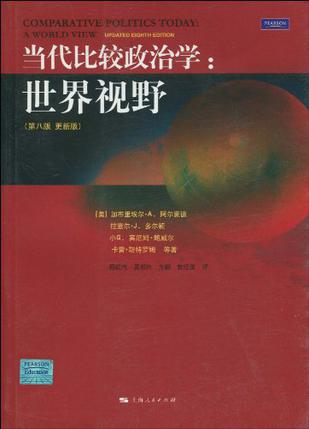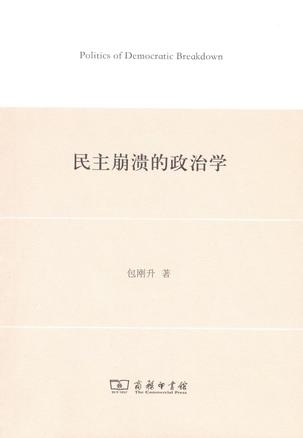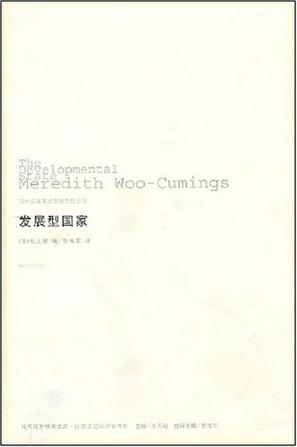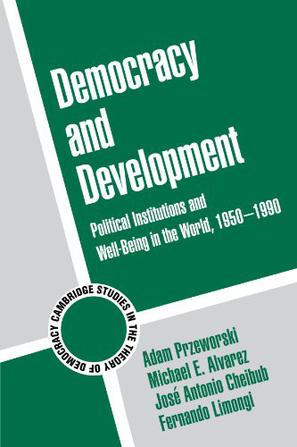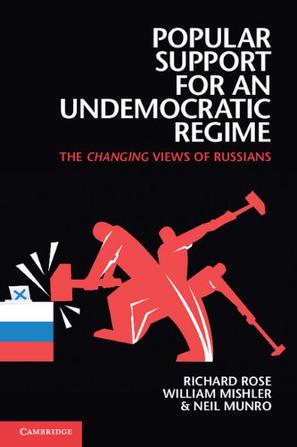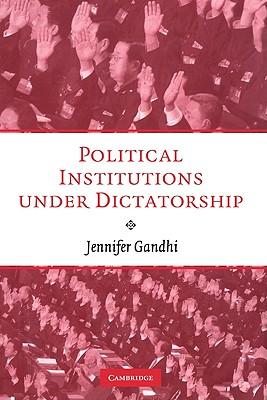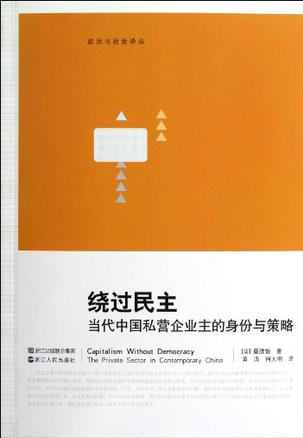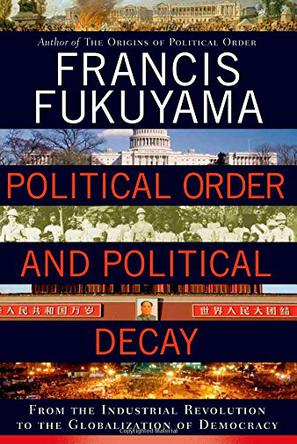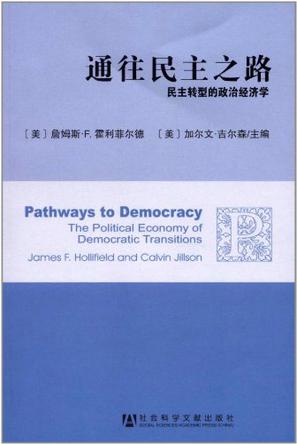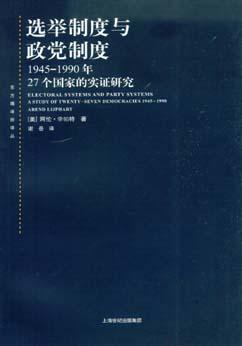欢迎来到相识电子书!
标签:比较政治
-
当代比较政治学
中译本序 序言(第八版) 序言(第八版更新版) 致谢 撰稿人 详细目录 第一部分 导论 第一章 比较政治学诸问题 第二章 比较政治体系 第二部分 体系、过程与政策 第三章 政治文化与政治社会化 第四章 利益表达 第五章 利益综合和政党 第六章 政府和政策制定 第七章 公共政策 第三部分 国别研究 第八章 英国政治 理查德·罗斯 第九章 法国政治 马丁·A.沙因 第十章 德国政治 拉塞尔·J.多尔顿 第十一章 日本政治 弗朗西丝·罗森布鲁斯 迈克尔·F.蒂斯 第十二章 俄罗斯政治 托马斯·F.雷明顿 第十三章 中国政治 梅拉妮·马尼恩 第十四章 墨西哥政治 韦恩·A.科尼利厄斯 杰弗里·A.韦尔登 第十五章 巴西政治 弗朗西丝·哈格比安 第十六章 埃及政治 安·莫斯利·莱施 第十七章 印度政治 萨布拉塔·K.米特拉 第十八章 尼日利亚政治 罗伯特·J.蒙特 奥拉迪迈斯·阿博里萨德 第十九章 美国政治 奥斯丁·兰尼 -
Development, Democracy, and Welfare States
Review In this new work, the authors make another major contribution to the field of comparative political economy by examining in a thorough manner the various factors that influence the different trajectories of social policy (primarily the development and reform of welfare policies) in middle-income countries of Latin America, East Asia, and Eastern Europe. . . . This will be an important and widely cited work in the field. (Choice ) The in-depth comparative investigation into the welfare states in developing and former-communist countries provided in Development, Democracy, and Welfare States is unprecedented. This book will likely be the point of departure for most future work on welfare states in any of these regions. . . . The conclusion of the book, in addition to presenting the significant findings of this initial investigation, could be read as a research agenda for students of welfare-state (re)formation in Latin America, East Asia, and Eastern Europe. (Kristin Nickel Makszin Czech Sociological Review ) Review While many authors cannot see beyond the borders of their own country, Haggard and Kaufman masterfully compare Latin America, East Asia, and East Europe from a global perspective. These two great scholars analyze urgent contemporary problems, the status and future fate of the welfare state, and the relationship of changes with the creation and development of democracy with remarkable expertise, precision, and human empathy. (Janos Kornai, professor emeritus, Harvard University and Collegium Budapest ) -
民主崩溃的政治学
民主政体的崩溃是影响重大的政治事件。民主政体为什么会崩溃?本项研究试图系统地解释民主崩溃的原因和因果机制。现有文献从阶级斗争和不平等、经济落后及不稳定、结构性社会分裂、政治制度缺陷、政治精英行为与选择,以及国际因素等几种理论路径来解释民主崩溃。但是,现有理论的系统性和严谨性存在不足,适用的时空范围也比较有限。作者试图在已有研究基础上对民主崩溃提出一个新的理论解释:如果一个民主国家符合两个条件:一是选民政治分裂程度高,二是离心型政治制度安排,那么该国民主政体就倾向于崩溃。 民主政体的崩溃通常都起源于国内社会的某种政治紧张关系,如果这种政治紧张关系愈演愈烈,就会导致严重的政治危机。当这种政治危机无法在现有的民主政体框架内解决时,就会导致民主政体的崩溃。因此,理解政治危机的形成和激化,是解释民主崩溃的关键。政治危机的形成和激化需要两个条件。第一个条件是国内不同社会集团之间存在较为严重的政治冲突,而这种政治冲突是不同选民集团存在严重政治分裂的反映。第二个条件是民主国家没有能力去解决这种严重的政治冲突。因此,国家能力的高低也直接关系到民主政体的稳定性。固然,国家能力受到多种因素的影响,但民主政体下的政治制度安排很大程度上能决定国家能力的高低。从制度主义的视角讲,离心型民主政体会显著地削弱国家能力,从而使其无法应付剧烈的政治冲突。作者的观点可以归纳为:高度的选民政治分裂导致严重的政治冲突,而离心型制度安排无法塑造有效的国家能力,两者的结合倾向于导致民主政体的崩溃。 这项研究采用比较历史分析方法,在重点横向比较德国(1919-1933年)、尼日利亚(1960-1966年)、智利(1964-1973年)三个民主崩溃案例和印度(1947年至今)一个民主存续案例的同时,还对四国不同时期的民主经历进行了纵向比较,以揭示选民政治分裂程度和政治制度安排对民主崩溃或维系的影响。作者希望这项研究能对如何避免新兴民主政体的失败提供富有价值的启示。 -
发展型国家
《发展型国家》主要内容:国家与资本主义是比较政治经济学与国际政治经济学领域中的基本建构材料。这里有两种思考问题的.一些学者倾向于对政治结果的经济解释;运用供给或者需求等经济变量来解释选举或者对外贸易与政治相关的结果。 -
Informal Institutions and Democracy
This volume analyzes the function of informal institutions in Latin America and how they support or weaken democratic governance. Drawing from a wide range of examples—including the Mexican dedazo, clientelism in Brazil, legislative "ghost coalitions" in Ecuador, and elite power-sharing in Chile—the contributors examine how informal rules shape the performance of state and democratic institutions, offering fresh and timely insights into contemporary problems of governability, "unrule of law," and the absence of effective representation, participation, and accountability in Latin America. The editors present this analysis within a fourfold conceptual framework: complementary institutions, which fill gaps in formal rules or enhance their efficacy; accommodative informal institutions, which blunt the effects of dysfunctional formal institutions; competing informal institutions, which directly subvert the formal rules; and substitutive informal institutions, which replace ineffective formal institutions. -
The Political Economy of Democratic Transitions
In the last two decades, there has been a widespread movement from authoritarian to democratic rule among developing countries, often occurring against a backdrop of severe economic crises and the adoption of market-oriented reforms. The coincidence of these events raises long-standing questions about the relationship between economic and political change. In this book, Stephan Haggard and Robert Kaufman explore this relationship, addressing a variety of questions: What role have economic crises played in the current wave of political liberalization and democratization? Can new democracies manage the daunting political challenges posed by economic reform? Under what economic and institutional conditions is democracy most likely to be consolidated? Drawing on contemporary political economy and the experiences of twelve Latin American and Asian countries, they develop a new approach to understanding democratic transitions. Haggard and Kaufman first analyze the relationship between economic crisis and authoritarian withdrawal and then examine how the economic and institutional legacies of authoritarian rule affect the capacity of new democratic governments to initiate and sustain economic policy reform. Finally, the authors analyze the consolidation of political and economic reform over the long run. Throughout, they emphasize the relationship between economic conditions, the interests and power of contending social groups, and the mediating role of representative institutions, particularly political parties. -
Popular Support for an Undemocratic Regime
To survive, all forms of government require popular support, whether voluntary or involuntary. Following the collapse of the Soviet system, Russia's rulers took steps toward democracy, yet under Vladimir Putin Russia has become increasingly undemocratic. This book uses a unique source of evidence, eighteen surveys of Russian public opinion from the first month of the new regime in 1992 up to 2009, to track the changing views of Russians. Clearly presented and sophisticated figures and tables show how political support has increased because of a sense of resignation that is even stronger than the unstable benefits of exporting oil and gas. Whilst comparative analyses of surveys on other continents show that Russia's elite is not alone in being able to mobilize popular support for an undemocratic regime, Russia provides an outstanding caution that popular support can grow when governors reject democracy and create an undemocratic regime. -
Political Institutions Under Dictatorship
Review "This book represents a major contribution to the resurgent study of non-democratic regimes. It is one of the first substantial pieces of modern social scientific analysis of the phenomenon, skillfully combining formal and quantitative cross-national analysis with country case studies. It will have a major impact in the study of modern authoritarian regimes." -Miriam A. Golden, Professor of Political Science, University of California at Los Angeles "Jennifer Gandhi's book is not just a study of dictatorship, but an important contribution to comparative politics in general. While its topic is political institutions under dictatorship, its definition of dictatorship is the residual of a prominent and widely used definition and measure of democracy, so it builds a bridge between studies of democracy and of dictatorship. Her three kinds of dictatorship and two kinds of institutions produce a rich and informative empirical analysis in which she explains variation in the longevity, policy and performance of non-democratic governments." -William R Keech, Professor Emeritus of Political Economy, Carnegie Mellon University "Jennifer Gandhi has written a dazzling book. With incisive theorizing, a remarkable combination of formal theory and statistical analysis, and rich case studies, Gandhi has produced one of the first systematic comparative treatments of autocracy. Two of her main conclusions are that political institutions such as legislatures and political parties enable political bargains between dictators and their potential opponents, and that these institutions have major impacts on a wide range of outcomes, including economic performance. A must-read for anyone interested in comparative politics, political regimes and the political economy of development." -Beatriz Magaloni-Kerpel, Stanford University "In Political Institutions under Dictatorship, Jennifer Gandhi provides important insights into the role that political parties and legislatures play in dictatorships. She disputes characterizations of these institutions as simple 'window dressing,' finding instead that political parties and legislatures can play an important role in policy formation, implementation and regime survival. The reason, she argues, is that these institutions provide an arena within which incumbents and potential opponents can forge policy compromises. Her analysis of these effects through an impressive database of dictatorships in the post-war era is clear and refreshingly frank. Political Institutions under Dictatorship is a must-read for scholars interested in authoritarian politics." -Ellen Lust-Okar, Associate Professor of Political Science, Yale University "Gandhi breaks new ground in this theoretically and empirically rich book on authoritarian regimes that have adopted legislative institutions. These regimes are likely to spend somewhat less on the military, have a better human rights record, and provide more benefits to workers than their autocratic counterparts. While all of this sounds positive, Gandhi warns--contrary to the linear model of progressive democratization posited in modernization theory--that partial reforms may in fact allow authoritarian governments to prolong their rule by coopting the opposition." -Frances Rosenbluth, Yale University "Jennifer Gandhi's book is a welcome addition to this literature." Perspectives on Politics, Susan Rose-Ackerman, Yale University Product Description Often dismissed as window-dressing, nominally democratic institutions, such as legislatures and political parties, play an important role in non-democratic regimes. In a comprehensive cross-national study of all non-democratic states from 1946 to 2002 that examines the political uses of these institutions by dictators, Gandhi finds that legislative and partisan institutions are an important component in the operation and survival of authoritarian regimes. She examines how and why these institutions are useful to dictatorships in maintaining power, analyzing the way dictators utilize institutions as a forum in which to organize political concessions to potential opposition in an effort to neutralize threats to their power and to solicit cooperation from groups outside of the ruling elite. The use of legislatures and parties to co-opt opposition results in significant institutional effects on policies and outcomes under dictatorship. -
Media Commercialization and Authoritarian Rule in China
In most liberal democracies commercialized media is taken for granted, but in many authoritarian regimes the introduction of market forces in the media represents a radical break from the past with uncertain political and social implications. In Media Commercialization and Authoritarian Rule in China, Daniela Stockmann argues that the consequences of media marketization depend on the institutional design of the state. In one-party regimes such as China, market-based media promote regime stability rather than destabilizing authoritarianism or bringing about democracy. By analyzing the Chinese media, Stockmann ties trends of market liberalism in China to other authoritarian regimes in the Middle East, North Africa, sub-Saharan Africa and the post-Soviet region. Drawing on in-depth interviews with Chinese journalists and propaganda officials as well as more than 2000 newspaper articles, experiments and public opinion data sets, this book links censorship among journalists with patterns of media consumption and media's effects on public opinion. -
比较政治评论(第一辑)
本辑刊由人民大学长江学者杨光斌主编,该书从全国征集文章并精选,主要从中外比较角度,探讨政治制度方面的诸多问题。分为主题研讨、专题论文、学术综述和学术通讯四大版块。本期主要反思与重构比较政治学的范式问题,包括比较历史分析方法论和作为民主化替代范式的国家治理等。 -
日本政治
本书作者京极纯一是日本当代著名政治学家,著述颇丰,其中以《日本政治》一书最具代表性和影响力。 本书是作者以在东京大学讲授的课程讲义为基础,尝试对日本的政治过程进行系统性说明的成果。全书分为三个部分,第一部分“政治结构”,作者概述了近代以来日本政治的发展历程,但着眼点不在于对历史的记述,而在于阐明周而复始的一种定型;第二部分“秩序的构图”为全书的核心内容所在,作者在该部分提出了分析日本政治的独到理论框架;第三部分“权力的运用”,作者基于在第二部分中提出的理论框架,尝试对现实的日本政治进行分析。 本书是一部特色鲜明且极富创造性的政治学著作,书中所展示的许多立论、新概念以及对现实日本政治的独到分析,迄今仍是日本其他政治学著作中难以见到的。 -
绕过民主
本书主要内容包括: 中国民主资本家的神话 ; 绕过民主: 政权稳定、非正式制度及政治变革 ; 中国私营经济的非正规及正规的复活等。 -
Political Order and Political Decay
The second volume of the bestselling landmark work on the history of the modern state Writing in The Wall Street Journal, David Gress called Francis Fukuyama’s Origins of Political Order “magisterial in its learning and admirably immodest in its ambition.” In The New York Times Book Review, Michael Lind described the book as “a major achievement by one of the leading public intellectuals of our time.” And in The Washington Post, Gerard DeGrott exclaimed “this is a book that will be remembered. Bring on volume two.” Volume two is finally here, completing the most important work of political thought in at least a generation. Taking up the essential question of how societies develop strong, impersonal, and accountable political institutions, Fukuyama follows the story from the French Revolution to the so-called Arab Spring and the deep dysfunctions of contemporary American politics. He examines the effects of corruption on governance, and why some societies have been successful at rooting it out. He explores the different legacies of colonialism in Latin America, Africa, and Asia, and offers a clear-eyed account of why some regions have thrived and developed more quickly than others. And he boldly reckons with the future of democracy in the face of a rising global middle class and entrenched political paralysis in the West. A sweeping, masterful account of the struggle to create a well-functioning modern state, Political Order and Political Decay is destined to be a classic. -
通往民主之路
《通往民主之路:民主转型的政治经济学》讲述了,20世纪后期,人们比以往更能自由地主宰个人的命运,追求个人的经济利益。共产主义已经衰退,专制体制也在垂死挣扎。虽有偶发极端事件,但世界仍处于和平状态。这种自由民主式的和平不是基于权力制衡,而更多的是基于在自由国家的相互依赖体系和多样化的国际组织支撑下所形成的市场与权利的双重驱动。 《通往民主之路:民主转型的政治经济学》考察了不同国家——包括拉丁美洲、亚洲、东欧、非洲国家——所采取的不同民主转型路径,以及稳定新的民主体制所需要的政治和经济方案。通过分析军管体制、专制体制的寡头政治集团,揭示了统治集团内的分歧怎样推动了民主转型,统治集团外的群体和利益集团怎样发出挑战,以及为什么结果往往是经济表现不佳。本书还就美国外交政策对民主化的推动和投入问题进行了广泛探讨。 在众多有关“向民主转型”的文集中,本书不仅是最新的、最权威的,也是最好的。本书对专制体制向民主体制转型中的成功、踌躇,以及超乎想象的一面进行了比较研究,睿智、坦诚。令人耳目一新。 -
Defeating Authoritarian Leaders in Postcommunist Countries
Why would authoritarian leaders ever lose elections? Valerie J. Bunce and Sharon L. Wolchik answer this question by analyzing a remarkable run of electoral victories by the opposition in postcommunist Europe and Eurasia from 1998 to 2005. They conclude that these upset elections occurred because of the hard and creative work of a transnational network that was committed to electoral change and composed of local opposition and civil society groups, members of the international democracy assistance community, and graduates of successful electoral challenges to authoritarian rule in other countries. -
政治与市场
《政治与市场:世界的政治—经济制度》是林德布洛姆的一部最重要的著作,也是当代西方比较经济学和政治学的名作之一。这本书主要以欧美,苏东,中国和古巴为经验对象,研讨林德布洛姆所讲的成型及成熟的世界主要的政治经济制度的结构,组织方式及其意识形态,寻找各种体系的异与同,客观分析它们的起源,现状及走势,比较评说它们的成就和缺陷。 与西方现代政治学的许多“纯理论”的经典不同(如阿尔蒙德,达尔,亨廷顿等人的作品),也有别于比较经济学——这一学科作为成熟的形态是在60年代才刚刚崛起——的许多重要成果,林德布洛姆的这本书把比较经济学和比较政治学两大学科的对象与方法巧妙地结合使用,娴熟地贯穿制度分析的始终;作为一部“毋宁说更多地是经验的”著述,作者却同时独辟蹊径地在理论和研究手法上提出了新的内容:例如,在政府(政府)与市场的关系这一“个案”式的主题下面,林德布洛姆教授避开了传统的市场与计划,“资本主义”与“社会主义”,集权(集中)与分权(分散)的分析套路,相反,他从权威(国家权力),交换(市场关系),说服(训导制度)三种范畴出发(他称之为“要素”,建构,显示和比较人们平日熟悉的各种政治—经济组织构造之)异同,并阐发了一系列既有特色又有内在逻辑的命题(论点),如:西方多头政治中趋于明显化的大众化控制的循环;实业界在市场经济内的特权地位以及市场制度的双重领导权;西方的政府和公司在计划和管理上不同于“东方”的创新;权威方式与说服方式(训导式“教育”)的并用与差异(尤其在他所说的“共产主义制度”——现实社会主义国家的应用);市场社会主义的长处,限度以及它在东西方的经验对照(林德伯洛姆取70年代的南斯拉夫,一定程度上还有当时的匈牙利为这一实验的范例)。 逻辑和分析当然有时令人殚精竭虑,但林德布洛姆在书中列举的大量饶有趣味,生动形象的事实证据以及鲜明且一以贯之的线索,想必会给勤于思考,择善固执的读者带来仔细阅读的兴致。 -
The Logic of Violence in Civil War
By analytically decoupling war and violence, this book explores the causes and dynamics of violence in civil war. Against the prevailing view that such violence is an instance of impenetrable madness, the book demonstrates that there is logic to it and that it has much less to do with collective emotions, ideologies, and cultures than currently believed. Kalyvas specifies a novel theory of selective violence: it is jointly produced by political actors seeking information and individual civilians trying to avoid the worst but also grabbing what opportunities their predicament affords them. Violence, he finds, is never a simple reflection of the optimal strategy of its users; its profoundly interactive character defeats simple maximization logics while producing surprising outcomes, such as relative nonviolence in the 'frontlines' of civil war. -
选举制度与政党制度
《选举制度与政党制度:1945-1990年27个国家的实证研究》作者阿伦·李帕特,摆在我们面前的是新制度主义政治学大师的又一部力作,它完成于20世纪90年代,虽然研究方法带有浓厚的美国色彩和比较政治学的痕迹,但是这恰恰构成了其学术价值的重要组成部分,特别对中国政治学界来说,如何将政党和选举研究赋予更加科学和国际化的意义,比较研究方法显然是一种有效的工具。
热门标签
下载排行榜
- 1 梦的解析:最佳译本
- 2 李鸿章全传
- 3 淡定的智慧
- 4 心理操控术
- 5 哈佛口才课
- 6 俗世奇人
- 7 日瓦戈医生
- 8 笑死你的逻辑学
- 9 历史老师没教过的历史
- 10 1分钟和陌生人成为朋友

